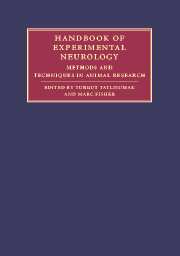Book contents
- Frontmatter
- Contents
- List of contributors
- Part I Principles and general methods
- 1 Introduction: Animal modeling – a precious tool for developing remedies to neurological diseases
- 2 Ethical issues, welfare laws, and regulations
- 3 Housing, feeding, and maintenance of rodents
- 4 Identification of individual animals
- 5 Analgesia, anesthesia, and postoperative care in laboratory animals
- 6 Euthanasia in small animals
- 7 Various surgical procedures in rodents
- 8 Genetically engineered animals
- 9 Imaging in experimental neurology
- 10 Safety in animal facilities
- 11 Behavioral testing in small-animal models: ischemic stroke
- 12 Methods for analyzing brain tissue
- 13 Targeting molecular constructs of cellular function and injury through in vitro and in vivo experimental models
- 14 Neuroimmunology and immune-related neuropathologies
- 15 Animal models of sex differences in non-reproductive brain functions
- 16 The ependymal route for central nervous system gene therapy
- 17 Neural transplantation
- Part II Experimental models of major neurological diseases
- Index
- References
2 - Ethical issues, welfare laws, and regulations
Published online by Cambridge University Press: 04 November 2009
- Frontmatter
- Contents
- List of contributors
- Part I Principles and general methods
- 1 Introduction: Animal modeling – a precious tool for developing remedies to neurological diseases
- 2 Ethical issues, welfare laws, and regulations
- 3 Housing, feeding, and maintenance of rodents
- 4 Identification of individual animals
- 5 Analgesia, anesthesia, and postoperative care in laboratory animals
- 6 Euthanasia in small animals
- 7 Various surgical procedures in rodents
- 8 Genetically engineered animals
- 9 Imaging in experimental neurology
- 10 Safety in animal facilities
- 11 Behavioral testing in small-animal models: ischemic stroke
- 12 Methods for analyzing brain tissue
- 13 Targeting molecular constructs of cellular function and injury through in vitro and in vivo experimental models
- 14 Neuroimmunology and immune-related neuropathologies
- 15 Animal models of sex differences in non-reproductive brain functions
- 16 The ependymal route for central nervous system gene therapy
- 17 Neural transplantation
- Part II Experimental models of major neurological diseases
- Index
- References
Summary
Introduction
The ethics, morals, and laws of any culture or nation are intimately interwoven and dependent upon each other for their continuation within that society. At the same time most cultures are under continual evolution, change, and development due to many factors, but usually due to ingress, influences, and pressures from other external factors and cultures. This is best illustrated by the notion that “developed” nations frequently bring about cultural changes in very old “traditional societies” through their presence and financial impact. Once there is cultural change, then almost certainly it will be followed by changes in the ethical and moral stances taken. Ultimately the laws and regulations will no longer reflect or uphold the current “values” of that society and will need modification.
This point is made to emphasize the fact that ethics and morals are not only diverse in a global sense but also dynamic. What was once ethically acceptable in history (e.g., slavery) may now be locally or globally seen as morally wrong and laws enacted to reflect those views.
With regard to laws it must also be acknowledged that as the “global village” becomes an increasing reality so does a meeting of minds on points of ethics and morals. As the meeting of minds becomes a reality, then it is possible to develop and implement international laws and regulations. This is particularly pertinent when considering the European position with regard to the Council of Europe (CoE) and the European Union (EU).
- Type
- Chapter
- Information
- Handbook of Experimental NeurologyMethods and Techniques in Animal Research, pp. 6 - 18Publisher: Cambridge University PressPrint publication year: 2006

